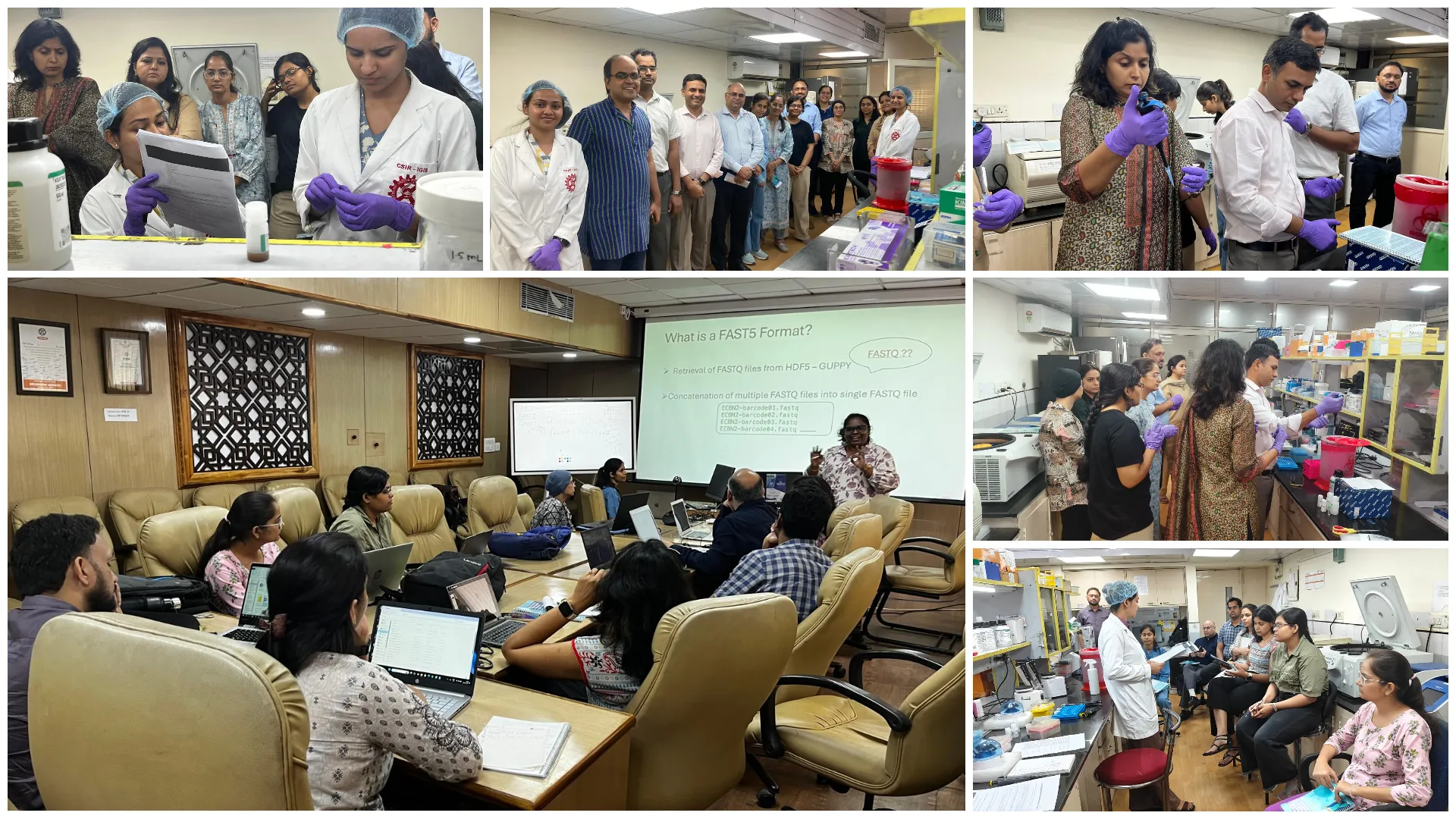Ashoka University, in collaboration with the Council of Scientific and Industrial
Research–Institute of Genomics and Integrative Biology (CSIR–IGIB), organized a 2-day
hands-on workshop on DNA sequencing on August 29th and 30 th at IGIB. The workshop was
carried out as part of the Rockefeller Foundation-Alliance for Pathogen Surveillance
Innovations-India (RF-APSI-India) program.
Mandate
- The workshop covered a range of topics, including:
Introduction to DNA Sequencing: Overview of sequencing technologies available
and their application Next-Generation Sequencing (NGS) Techniques: Principles of NGS, platforms
used, and the advantages of high-throughput sequencing. Sample Preparation and Quality Control: Detailed demonstration of DNA
extraction, quantification, and quality assessment for sequencing. Library Preparation: Hands-on session on preparing sequencing libraries. Data Generation and Analysis: A walkthrough of sequencing data generation,
quality control, and preliminary data analysis using bioinformatics tools.
Participants
This 2-day workshop at CSIR-IGIB included participants such as clinicians, clinical
researchers, path lab technicians, pharmacists mainly from the Delhi-NCR and adjoining
states. The workshop featured an introduction to pathogen sequencing, hands-on
demonstrations, interactive sessions, and talks from experts. Discussions centered around
integrating sequencing in clinical settings, particularly for the detection of Antimicrobial
resistance.
Program
The workshop was led by Dr. Rajesh Pandey, Principal Scientist at CSIR-IGIB and Dr
Shraddha Karve, Faculty Fellow at Ashoka.
On the first day, August 29th, the event began with an introduction by Dr. Aradhita Baral,
Senior Program Manager at Ashoka University, followed by a detailed overview of DNA
sequencing and its importance by Dr. Rajesh Pandey . Dr Shraddha Karve, Faculty Fellow at
Ashoka University demonstrated introduced the importance of DNA extraction andDr.
Rajesh Pandey provided insights into Nanopore sequencing. Dr Jitendra Narayan, Senior
Scientist at CSIR-IGIB discussed the AMR Bioinformatics Workflow, and Dr Jaisri
Jagannadham Project Lead at Ashoka University taught the analysis module for building
genomic assembly from raw data.
The workshop included presentations on technical and theoretical aspects of DNA
sequencing by experts from Ashoka University and IGIB.
Hands-on training of genomic DNA extraction:
Dr. Shraddha Karve and her team initiated the hands-on DNA extraction protocol using.
Qiagen DNEasy Blood and Tissue kit, a silica column based DNA extraction method. This is
a standardized a protocol to extract DNA from bacterial culture. It is a reasonably priced but
highly efficient kit and requires basic laboratory equipment which can easily be found in
most routine laboratories.
Hands-on Demonstration of Nanopore Sequencing:
Dr. Rajesh Pandey and his team initiated the hands-on training on Sequencing on Day 1,
covering multiple steps such as library preparation, priming, and sample loading on
Nanopore. The participants were trained in WGS Library Preparation using the Native
Barcoding Kit 24 V14. They were also taken on a Sequencing facility visit to shaow the
different types of sequencer available and their usage.
On the second day, 30 th August, participants continued with library preparation training and
further analysis.
The final session of the workshop was led by Dr. Jaisri Jagannadham, who taught participants
how to build a genomic assembly from raw data and perform downstream analysis to
determine genes that confer resistance.
Learning through interactive sessions:
The workshop concluded with an engaging session in which Dr. Rajesh Pandey addressed
general and technical queries from the participants. Certificates were given to participants
who attended all sessions on both days.
- Key Outcomes
Increased Competence in Sequencing Techniques: Participants trained
and hence gained confidence in performing key steps of the sequencing
process, including DNA extraction, library preparation, and data interpretation. Understanding Clinical Relevance: Attendees better understood how
sequencing technologies can be applied in clinical set up, particularly in
identifying pathogen genomes. Collaboration and Networking: The workshop fostered provided an
opportunity for prospective collaborations. Feedback: Participants valued the opportunity to work directly with
sequencing equipment and software. They appreciated the availability of
experts to clarify their doubts
Dr. Aradhita Baral,
Sr Program Manager,
Ashoka University and Abha Tiwari,
Project Manager,
Ashoka University.
